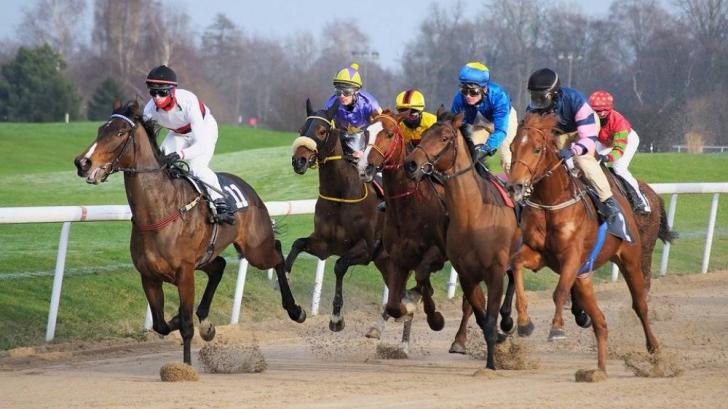Racing Horses – The Exhilarating And Awesome History

Introduction: Racing Horses – The Exhilarating And Awesome History
Without a doubt, racing horses is one of the most popular sports in the world. And it’s also one of the sports that’s most associated with sports betting. But in terms of the most popular sports for betting, it comes in a lowly fifth place, beaten by basketball, tennis, cricket, and football or soccer as they say in the US.
One of the key experiences that go hand-in-hand with wagering on the horses is actually attending the racecourses themselves. There is a Bonaire about dressing up and watching all the other racegoers, with the ladies in their glamorous outfits and the gentlemen in their penguin suits. Probably because racing horses has always been associated with the upper classes and with royalty, it has always carried and continues to carry a certain cache.
But how did racing horses become the most bet on sport in the world? For that we first have to ask ourselves, how did horse racing become so popular in the first place? So, without further ado, let’s have a look at the history of horse racing and why it still holds a place in the heart of so many sports bettors all around the world today. Rather than giving any horse racing tips, today we’re going to take a look into the history of the King of Sports.
The History of Racing Horses
You don’t have to be much of an expert in horse racing history to know that racing horses have taken place for at least the last few thousand years. The Romans celebrated horse racing as well as charity chariot racing, and we can safely assume that the Romans actually bet on these events. Of course, everything the Romans did, they took from ancient Greece. In fact, the ancient Olympic Games featured both racing horses and chariot racing. It seems that the very first horse races were held soon after man domesticated the animal, which would put the first races at around 4500 BC.
Horse racing as we know it today really started around the 12th century in England. Before this, English horses were not really suited for racing, as they tended to be heavier and less agile. But the knights returning from the first Crusades bought purebred Arab horses with them. These were well-known for their speed and beauty, and over the next 400 years or so, the higher classes of English society would selectively breed Arab stallions with English mares.
This produced a horse that was both powerful but also was able to run for sustained periods, as the Arab horses were known for their stamina. It wasn’t long before the nobles were racing horses against each other and organising lavish meetups over these events. The same goes on to this day. But there’s no need to dress up if you’re playing online from home. Head over to 1xBET Sportsbooks for a nice welcome bonus of 100% up to €100. It’s a great way to get started.
The Beginnings of Modern Horse Racing

Horse racing became a professional sport during the early part of the eighteenth century. As we mentioned before, these first races were probably matchups, which saw a couple of horses competing head-to-head. You can imagine it wasn’t long before this evolved into multi horse competitions. New racecourses began to spring up all over England thanks to the popularity of this new sport. The more race tracks that opened, then the size of the prizes began to grow in order to attract the best jockeys and the best horses.
Due to the explosive growth in both the popularity and the size of horse racing, and a horse racing business that went hand-in-hand with it, there was a need to create a set of rules and a level playing field for the sport in general. Thus we saw the formation of the Jockey Club which took place in the English town of Newmarket in 1750. This organisation continues to regulate horse racing to this day.
The Jockey Club has developed regulations that cover every aspect of the sport including both the racing of the horses and the racecourses they race on. It also includes sections on the correct way horses should be bred, the correct terms, and even goes as far as to recommend how people should behave and dress at the racetrack. Since its inception in 1791, there has been a General Stud Book, which keeps track of every single racehorse that has been bred since that time. To be featured in the studbook, a horse needs to prove that it can be traced back to one of just three original stallions.
Brits Exported Racing Horses
Thanks to the British Empire, it wasn’t long before horse racing was being spread around the world in the same way cricket, rugby, and football ended up being played in the colonies. In America, the first racecourse was built on Long Island in 1665. Horse racing most popular on a local level, though it wasn’t until 1868 that it began its spread nationally, gradually becoming a very popular sport and sporting event. This was the same year that the American Studbook was produced.
Over 315 racecourses were built in the space of just 20 years. All these United States tracks were overseen by the American Jockey Club which was formed in 1894. This is the organisation that governs the sport of racing horses across the US today.
The History of Wagering on Horses
Betting on the horses is one of the oldest betting sports in the world. We know for certain that during the middle ages nobility was betting on their own horses in competition with others, and in so doing, learning how to win the jackpot. By the time the 18th century came around, the sport was attracting spectators in the form of members of the general public, who began betting themselves. It was this increase in betting that helps to ensure larger prizes for available for race winners, and this, in turn, drove a boom in horse breeding.
In typical American fashion, the government was unsure as to how to legislate and control the sport of racing horses. To that end, in the early part of the 20th century, the government introduced prohibition. We know mainly about this in regards to the sale and consumption of alcohol. But Prohibition was also designed to stamp out all sorts of sports betting. The direct result was then the number of race tracks in the early 1900s fell from 314, to only 25/8 years later.
Racing Horses: The Races Are Quick

One probable reason for the popularity of racing horses and the sheer number of available bets is tied to the length of the actual competition itself. On the whole, horse races last for a much shorter duration than many other sporting events such as football, basketball, or tennis. Thereby letting the gambler see the results of their wages faster, thus allowing them access to any winnings more quickly, than with other sporting events. This faster turnover can increase your jackpot winning chances.
You can probably compare this to the players playing jackpot slots machines in the casino. As you know, this is by far the most popular game and probably the largest contributor to the profits of casino companies. Here we have a case of unpredictable outcomes along with simplicity to the whole gambling experience which makes slot machines more exciting. We should also note that the social element has a certain appeal when it comes to horse racing. Standing shoulder to shoulder, yelling encouragement at your favourite horse, along with everyone else.
Racing Horses: Economic Benefits
The success of racing horses can be directly tied to the size of revenues generated from wagering for each race. Around 14% – 25% of the total amount wagered will end up in the pockets of the racecourse. This translates as approximately $11 billion in the USA alone. Worldwide, the annual revenue for horse racing is estimated to be around $2.75 billion. If you’re going to bet on the horses, then we recommend 1xBet Sportsbook for great odds.
Though horse racing has had mixed fortunes during its 6,000-year history, especially in the Americas, where the legal environment hasn’t been exactly friendly, we see this sport continuing in its popularity. As long as there are horses, and race tracks and sports betting shops, then we see the king of sports continuing to flourish well into the future.














